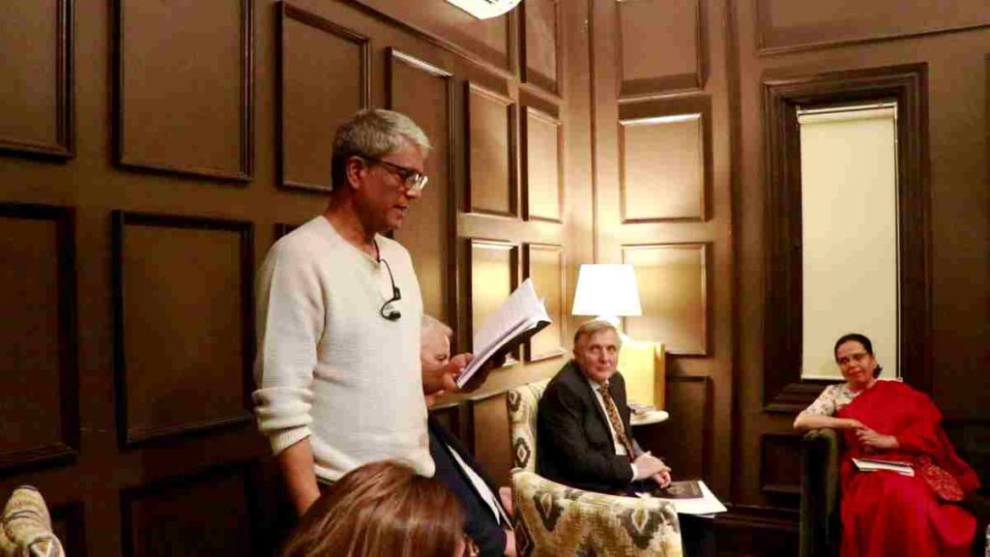INDIA. New Delhi: The Embassy of Bosnia and Herzegovina recently hosted a panel discussion on the Bosnian poet Mehmedalija Mak Dizdar’s seminal work of poetry, ‘Kameni spavač’ aka ‘Stone Sleeper’ at the Bikaner House. The panellists included the Honorable Ambassador of Bosnia, H.E. Mr. Muhamed Čengić, noted writer and literary historian Rakhshanda Jalil, poet, and short story writer Sayed Azhar Hashmi Sabqat, and translator Pramod Shah Nafees, who has translated ‘Stone Sleeper’ into Hindi as ‘Khak Mein Suratein.’ The discussion was moderated by the journalist and critic Murtaza Ali Khan.
Mak Dizdar’s most famous book, Stone Sleeper, is full of beautiful and haunting poems. These poems were inspired by tombstones and their inscriptions. They take the reader on a journey into the mysterious heart of mediaeval Bosnia. The poems form a three-way dialogue between the modern poet, the Christian heretics awaiting Judgement Day beneath their enigmatically-carved tombstones, and the heretic hunters.
Beneath the local and temporal, Dizdar explores universal issues: the value of resistance, though it might be futile; of faith, though it might be illusory; and of life, though it ends in death.
Speaking about the relevance of Dizdar’s collection of poems, Nafees explained, “It’s a very new introduction of a new culture, a very historical culture, which is represented by the symbol of the ‘stone sleeper’—a mysterious figure who lies in a state of eternal sleep, buried beneath the mountains. The poems are characterized by their rich imagery, symbolism, and metaphysical themes. They often draw on the natural landscape as well as its history and mythology, to explore the relationships between three things: human beings, earth, and heaven.”
Talking about his deep connection with Dizdar’s ‘Stone Sleeper,’ Ambassador Čengić recalled, “When this book of poetry was first published at that time we were more sensing the heights of Dizdar’s poetry than deeply understanding meanings that are simultaneously earthy and heavenly, – described by poet’s masterly use of his mother language. When I was at the university; at that time, it was very popular, and even some of the pop groups were singing, some of these poems.”
“We are settling that this poetry has deep meaning, but at that time it was enough to make this voice because there is more deep meaning that was explaining that was more related to metaphysics and something that matched both worlds. It shows that we are all interconnected throughout our history and our main fundamental issues,” he added.
Sharing her thoughts about Dizdar’s ‘Kameni spavač,’ Jalil said, “For a poet to rise above the style and circumstance and speak to us I think that’s the hallmark of the poetry and has made this thing very localize and it’s oriented. And Ambassador Cengic found a local translator for translation. And it looks like a folktale popular in a given geopolitical area. Unfortunately, we in India know very less about Bosnia or Medieval Bosnia. And all this is in this book. When a poet is talking about human emotion it’s all the same and universal.”
Speaking about the book, Sayed Azhar Hashmi rejoiced, “There is spiritual beauty in Dizdar’s ‘Stone Sleeper.’ If you read the poetry in this book, you will feel a sense of spirituality. For me, a major attraction is the name of the Hindi title ‘Khakh Mein Soorate,’ which refers to a poem by Ghalib. I strongly recommend that everyone should this book of poetry by Mak Dizdar.”
The panelists also recited poems from Dizdar’s epic work. Ambassador Čengić recited the original poems in Bosnian, while Pramod Shah Nafees recited the Hindi translations of the poems. Rakshanda Jalil also recited the poems in Hindi. Noted Indian actor Adil Hussain, who was also present on the occasion, recited poems from the English translation of Mak Dizdar’s ‘Kameni spavač’ by Francis R. Jones.
On the occasion, Ambassador Čengić also revealed that the Bangla version of the book is currently being finalized. He also announced that the Embassy of Bosnia and Herzegovina will be giving away copies of the Hindi translation of ‘Stone Sleeper’ across India.
Source: transcontinentaltimes































